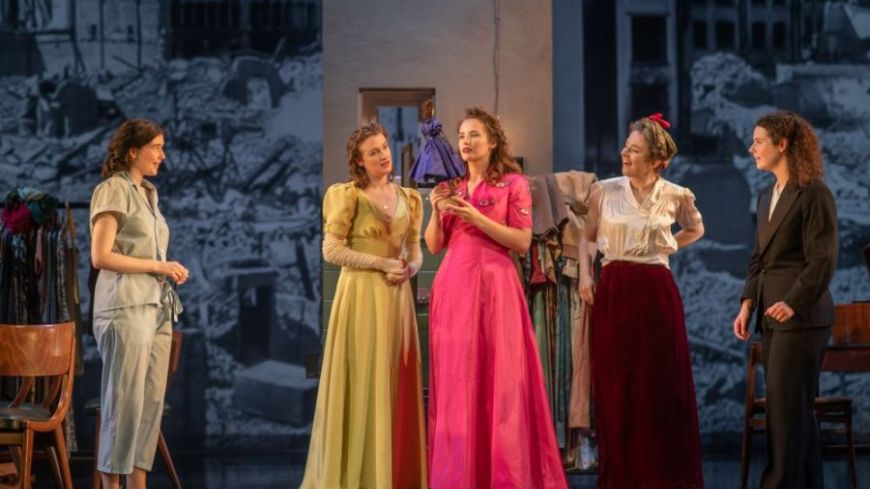
Evelyn Waugh described the novels of Muriel Spark as ‘clever and elegant.’ With a cool, precise tone of voice, her fiction appears to be light-hearted, amusing and sardonic, while also dealing with profound philosophical and religious themes.
Her finest work is semi-autobiographical: "In the Spring of 1944 on my return from Africa, I went to London to find a job and soon established at the Helena Club, for ladies from good families of modest means who are obliged to pursue an occupation in London. This was the original May of Tech Club in 'The Girls of Slender Means.’ " Muriel Spark, Curriculum Vitae
The play begins with a brief prologue set in 1963 when Jane, editor of Elan fashion magazine, is devastated to hear that her dear friend, Nicholas has been killed in Haiti while working as a Catholic missionary.
In flashback, the action moves to 1945, the months between VE and VJ day depicted by a stark backdrop photograph of the bombed streets of war torn London. At the May of Tech Club, there are five young women employed as secretaries in various offices: Jane, originally from Edinburgh, works for a rather disreputable publisher, and Joanna, the daughter of an Anglican rector, enjoys teaching elocution; the self obsessed Selina is pretty and very slim, constantly counting calories in order to squeeze through the tiny bathroom window; the aristocratic Anne treasures a shocking pink Schiaparelli evening gown, which she lends to the girls for special dates. Drifting about like an airhead dreamer, Pauline boasts about her love affair with film actor Jack Buchanan, although no one ever meets him.
While relishing a new independent lifestyle, they beg and barter coupons for clothes, lipstick, eggs and tea, and complain about the Club’s meals and drawing room wallpaper. Fashionably dressed, (from tweed skirts, jazzy jumpers to vividly colourful frocks), they balance magazines on their heads to improve poise for ‘the attainment of self-confidence’, chatter and gossip, planning nights out for drinks and dancing with vivacious glee.
Their quiet, cosy life is turned upside down when Jane invites the rather dashing Nicholas Farringdon, an anarchist poet, for coffee one evening. Gauchely assuming he would offer inspiring conversation but quickly realises this is a group of intelligent, literary-minded women. He immediately shares a love of Gerard Manley Hopkins with Joanna, reciting lines from The Wreck of the Deutschland in unison and is impressed to learn that Jane worked in military intelligence during the war; however, he is soon attracted to beauty rather than brains.
At the Publishing House, Jane has the tedious task to send fictionalised letters to famous authors in order to receive autographed replies, when she would prefer to write poetry. With her dark wavy hair, educated, middle class accent and strong-minded attitude, Molly Vevers brilliantly captures the personality, wit and wisdom of Muriel Spark herself.
The 1940s is neatly evoked with a soundtrack of popular music and songs: a charming scene illustrates a glamorous Dance party where the girls are whisked off their feet by uniformed officers represented by waltzing mannequins.
Spark converted to Catholicism in 1954 when her literary style began to reflect her fierce sense of good and evil and the folly of human life. This thematic thread weaves through the play by Joanna’s recurring quotes from “The Wreck of the Deutschland” which relates the real life tale of five exiled German nuns who drowned en route to seek a new life in New York. Hopkins explores their strength of faith and trust in God as they face the tragic consequences.
‘The Girls of Slender Means’ is partly a story of religious conversion and finding faith, (Nicholas and Joanna), or the lack of it; Gabriel Quigley has deconstructed Spark’s novel as a playful, acerbic satire to reveal the poignant, poetic and spiritual heart of the narrative. The first act, however, does feel rather drawn out with repetitive chit chat about rationing and their impecunious situation which has been clearly dramatised from the start.
The entire ensemble cast portray the sharply defined characters, mannerism and mood of the period with carefree exuberance and graceful elan while the ever- present Schiaparelli gown is a symbol of beauty, romance and material wealth.
This tragi-comedy is a lament for a lost world and a prayer for a happier future, as these five bright young things try to forget the haunting sense of despair and death. Like Spark’s novels, this is a ‘clever and elegant’ production smoothly shifting between moments of joyful humour and shocking dramatic realism, performed throughout with perceptive insight.
'As they realised themselves in varying degrees, few people alive at the time were more delightful, more ingenious, more movingly lovely, and, as it might happen, more savage, than the girls of slender means.’ Muriel Spark
Showtimes:
23rd April to 4th May, 2024
Evenings, 7.30pm. Matinee, Wednesday and Saturday, 2.30pm.
Ticket prices, from £16
Age guidance, 12+
https://lyceum.org.uk/events/the-girls-of-slender-means

